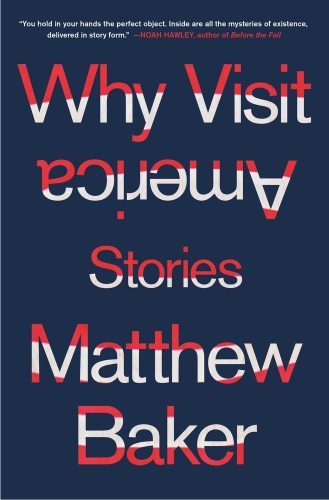Book Review: “Why Visit America” — Compelling Speculations on the Homeland
By Landry Harlan
It didn’t take long for this eminently readable and bingeable collection to draw TV adaptation attention.
Why Visit America by Matthew Baker. Henry Holt, 368 pages, $27.99.

Alt-America is great in Matthew Baker’s thrillingly ambitious new short story collection Why Visit America. In Kansas, criminals can safely reenter society. In Minnesota, nursing homes have been made obsolete. In Texas, people of all beliefs live together in harmony. Stay for a while, though, and the unsettling truth emerges. The memories of released convicts are wiped in “Life Sentence,” leaving them shells of their past selves. Nursing is unnecessary in “Rites” because old folks voluntarily kill themselves at age 70, cheered on by their kin. In the titular short story, the reason to visit America is because it has seceded from the “hellhole” United States. It only gets more surreal from there.
Baker is no stranger to strange storytelling. In his inventive short story debut collection Hybrid Creatures, each tale uses artificial languages — like HTML and music notation — as characters’ inner dialogue. This time around, he’s far more interested in external world building and social critiquing through the vein of speculative fiction. Don’t go looking for aliens, AI, and other sci-fi staples here, though. Baker’s speculations, thankfully, are much more grounded; the limits of the fantastical are firmly lodged in the familiar.
Slightly off-kilter universes are the hooks for these 13 stories, but it’s Baker’s posse of loners and outcasts, who desire escape and connection, that make this collection appeal to the head and the heart. In “The Transition,” an insular and feeble man who lives with his parents and “only seemed to come alive when exchanging messages with people over the internet” undergoes a procedure to transfer his mind completely online. Neighbors call it “unnatural.” His father considers it “lazy” and wanting “to live for free.” In “Testimony of Your Majesty,” a rich Nashville teenager living in a “gargantuan” house is bullied at school because her family doesn’t abide by “the ratio,” a popular “spiritual health” philosophy of material moderation. The ideal proportion is 100:1 (or owning 100 items per person). Her family’s ratio is 9000:1. At school she’s taunted as “Her Highness” and considered a pariah. She comes to realize that in a society where so many have so little, “to live as we lived was simply abhorrent. Barbaric, even.” So, she tries quitting wealth cold turkey and starts tossing belongings in the trash in order to belong. Her all-consuming craving to consume, though, isn’t so easily discarded.
As you might expect, the collection ranges in quality and contains some duds, though they are few and far between. The repetitive nature of certain ideas — as well as Baker’s penchant for overlong lists along with shocking but empty climaxes — grows tiresome at times. Take “The Tour,” where a trucker wins a lottery to spend the night with a famous, otherworldly prostitute known as “The Master.” He’s an isolated creature — “he could tug the pull cord of the air horn, but the automated trucks never honked back.” Any other background is reserved for his phantasmagorical experience with The Master, during which he revisits his past in a rambling, run-on, nearly 10-page-long sentence that culminates in a…nihilistic sex scene. Then there’s “Lost Souls,” the bleakest of the lot. Baker imagines a world in which half of the babies that are born are unresponsive and “empty,” dying promptly after. Desperate to save her future child, a pregnant woman and her husband move into a New Age-y desert facility that sacrifices an elderly patient daily to ensure that mothers are close to newly departed souls — who can latch onto their child in utero. Unfortunately, this intriguing premise devolves into a by-the-numbers maternal thriller that churns toward a predictable, blood-soaked ending.
Darkness and disenchantment may appear frequently in the pages of Why Visit America, but Baker doesn’t allow his characters — or the reader — to wallow in despair. His subtle and perceptive social critiques leave room for hope and reconciliation — “there’s no love as pure and as beautiful as the love between bitter enemies, united at last” ends one story. He also proves to have a knack for sharp and witty satire, like in the humorous “The Sponsor” where everything from weddings to buildings have corporate sponsors: the “Washington Monument, presented by Viagra™.” Out of the stories here, it will most likely hit most readers as almost “too real.”
It didn’t take long for this eminently readable and bingeable collection to draw TV adaptation attention. As early as last spring, major bidding battles were raging among studios and streamers — over a year before the publish date. “Lost Souls” is set to be a feature, “Life Sentence” and “Why Visit America” are headed to the small screen. Don’t wait until then. On screen, ambitious imaginative conceits often end up trouncing source material, and it is in the internal dialogue and the struggles among his characters that Baker excels. When read in succession, these speculative yarns coalesce into a sum greater than their parts, generating a vision that movingly depicts the need for human connection no matter how society develops. In Alt-America, that’s what it means to be free.
Landry Harlan is a writer based in Cambridge. He has written no books, but will happily and honestly tell you what he thinks about yours.
